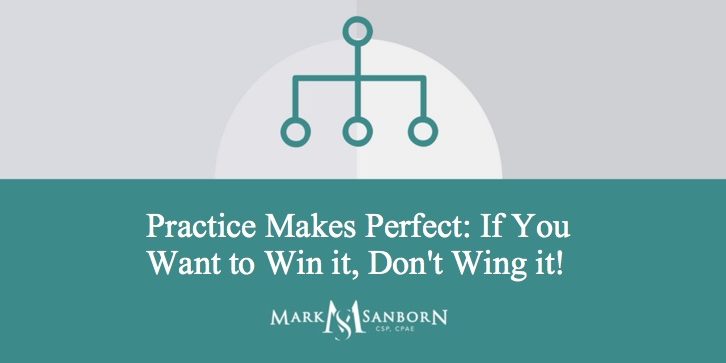If you’ve ever played a sport, learned a new skill, or started a new job, you’ve probably heard the term “practice makes perfect”.
While cliche to some, this term is one of the most important parts of achieving success.
Here’s an example…
Recently the president of an organization I was speaking for gave me a brilliant introduction (if you read my blog post on fast starters, then you know how important good introductions are).
What made the introduction so good?
Preparation and practice.
She carefully prepared what she was going to say and practiced how she was going to say it. She made it look so easy that most would have missed the effort that went into the introduction.
Here’s why practice makes perfect.
When you watch a master in action—whether they are giving a speech, playing an instrument or teeing off on a golf course—they make themselves appear to be larger than life (you can learn how to do that here). They make what they’re doing look easy.
Well, it isn’t.
Mastery creates an illusion, and that is because hundreds—if not thousands—of hours of practice and preparation enable the master to perform nearly effortlessly.
New sales professionals are often misled by the “old pro” who says he or she doesn’t prepare, but they just wing it. More often than not if the old pro is successful, their use of the term “winging it” is inaccurate.
They have amassed so many hours of practice and preparation, they don’t always need to traditionally prepare. But without the same amount of experience, the new salesperson usually flops when he or she tries to wing it.
This is why you should never underestimate the importance of preparation. When people say practice makes perfect, they really do mean that practice makes perfect.
Good preparation requires thought.
The quicker you prepare, the less effective the preparation. Are you willing to think a little harder than others? To be more creative? More strategic?
When I speak at corporate events, I always rehearse. Practice is rehearsal. It’s giving the sales presentation out loud, from beginning to end, and not just rehearsing it in your head. It is about videotaping your presentation before you give it live at the corporate event and looking for ways to make it better. It isn’t going through the motions—it is learning from the process.
Concentrate on giving a remarkable performance in every aspect of your life—your speeches, your career, and everything in between. You can learn more about how to improve your performance in my book, The Encore Effect.
You will improve any performance you prepare for and practice. You’ll win the day by doing those two simple but powerful things.
And unless you are a true master, you won’t win by winging it. And even the masters keep preparing and practicing to get better.
For more tips on how to give a great speech, click here.
To learn more about how to grow as a leader and speaker, take a look at any of my wide collection of resources. You can also consider reading my Extraordinary Living Journal – buy one, get one free!
If you enjoyed this post, here are three more articles you might also find interesting:
When to Fix and When to Fire
The Biggest Lie in Motivation
The One Thing Great Leaders Have in Common
Mark Sanborn is a bestselling author and acclaimed leadership keynote speaker. For more information about his services, visit www.marksanborn.com.
This post was originally published on January 15, 2019, and has been updated for 2020.








